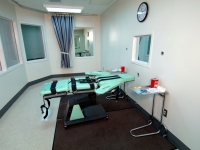News
U.S. executes 2 death row inmates in Georgia and Texas
USPA News -
A man convicted of killing his ex-girlfriend by dousing her with gasoline and setting her on fire was executed in Texas on Thursday evening, officials said, as authorities in the state of Georgia executed a man convicted of killing two college students. Carl Blue, 48, was pronounced dead at 6:56 p.m. local time on Thursday at Huntsville Unit in Walker County, Texas.
The execution by lethal injection came days after his appeals attorney raised a possible conflict of interest because Blue`s attorney was a co-counsel for the lead defense attorney in the case, but federal appeals were deemed pointless because Blue had waived his right to a different lawyer. Blue was convicted of the August 1994 murder of 38-year-old Carmen Richards-Sanders at her apartment in Bryan, about 100 miles (160 kilometers) northwest of Houston. Richards-Sanders had ended her relationship with Blue several months earlier and had since started dating Larence Williams. Police said Blue went to the woman`s apartment on the morning of August 19, 1994, with a large soft drink cup full of gasoline. When she answered the door, he doused her with flammable liquid and set her on fire. He threw the remaining gasoline on Williams, who was also in the apartment, and ignited him as well. Williams had attempted to come to the aid of Richards-Sanders but was unable to save her. The woman was critically injured and eventually died from her injuries several weeks later, on September 7, 1994. Williams survived the attack and later testified against him during the trial in 1995. Blue turned himself in to police, claiming the incident was a prank and that he did not intend to kill Richards-Sanders and Williams. He was convicted and sentenced to death by a Brazos County jury in April 1995, although this was eventually overturned by a federal judge because a state prison psychologist had testified the black man`s race could indicate a propensity for violence. Blue was sentenced to death a second time in 2001. During Thursday`s execution, Blue recognized he had done wrong and told relatives and witnesses to "get their life right with Christ." "Don`t ever think you`re perfect, none of us are perfect. God is the only one that is perfect. Jesus is perfect," he said as he was strapped to a gurney in the state`s death chamber. "I did wrong, now I am paying the ultimate price, even though it`s a crooked way. ... If ya`ll don`t have your life right, get it right. We all have to die to get to heaven. Get your life right with Christ; it`s coming to an end." Meanwhile in the state of Georgia, 38-year-old Andrew Allen Cook was executed for the murders of college students Michelle Cartagena, 19, and Grant Hendrickson, 22, in January 1995. The victims were sitting in a vehicle at Lake Juliette north of Macon, a city in Bibb county in central Georgia, when they were attacked at random. Cook was pronounced dead at 11:22 p.m. local time on Thursday at Georgia Diagnostic and Classification Prison in Jackson, south of Atlanta. The execution was carried out by lethal injection but it marked the first execution in Georgia since July 2012 when the state changed its procedure from a three-drug combination to a single dose of the sedative pentobarbital. Blue was the first person executed in Texas so far this year, but at least eleven others are scheduled to be executed in the coming months. According to the Death Penalty Information Center (DPIC), Texas has executed more than four times as many people as any other state since the United States reinstated the death penalty in 1976. Cook was the 31st inmate put to death by lethal injection in Georgia, and the 54th inmate to be executed in Georgia since the U.S. Supreme Court reinstated the death penalty in 1973. There are presently 93 men and one woman under death sentence in Georgia, but most will serve many years before they are executed.
Liability for this article lies with the author, who also holds the copyright. Editorial content from USPA may be quoted on other websites as long as the quote comprises no more than 5% of the entire text, is marked as such and the source is named (via hyperlink).






